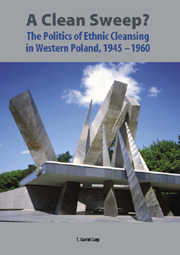Book contents
- Frontmatter
- Contents
- Acknowledgments
- Introduction: Hearts and Minds and Land: Ethnic Cleansing and the Stabilization of Postwar Poland
- 1 How the East Was Lost: Germany's Struggle for the Polish-German Borderlands, 1870–1945
- 2 Who Won the West: The Colonists and Ethnic Cleansers of Poznań and Eastern Brandenburg in 1945
- 3 Acts of Sacrifice: Poland's Ethnic Cleansing and the End of Political Pluralism, 1945–47
- 4 Counterrevolution from Above and Abroad: The Delocalization of Politics and the Beginning of Polish Stalinism's Antinational Counterrevolution, 1947–49
- 5 Waging Counterrevolution: The Party-State's Struggle for Hearts, Minds, and Land in Wielkopolska, 1949–53
- 6 Revolutions before the Revolution: National Solidarity and the Long Retreat of Stalinism in Wielkopolska, 1953–56
- 7 The Revolutions Betrayed? The Poznań Revolt and the Polish Road to Nationalist Socialism, 1956–60
- Conclusion: A Near Run Thing From National Solidarity to Solidarity
- Abbreviations
- Notes
- Bibliography
- Index
Conclusion: A Near Run Thing From National Solidarity to Solidarity
Published online by Cambridge University Press: 12 September 2012
- Frontmatter
- Contents
- Acknowledgments
- Introduction: Hearts and Minds and Land: Ethnic Cleansing and the Stabilization of Postwar Poland
- 1 How the East Was Lost: Germany's Struggle for the Polish-German Borderlands, 1870–1945
- 2 Who Won the West: The Colonists and Ethnic Cleansers of Poznań and Eastern Brandenburg in 1945
- 3 Acts of Sacrifice: Poland's Ethnic Cleansing and the End of Political Pluralism, 1945–47
- 4 Counterrevolution from Above and Abroad: The Delocalization of Politics and the Beginning of Polish Stalinism's Antinational Counterrevolution, 1947–49
- 5 Waging Counterrevolution: The Party-State's Struggle for Hearts, Minds, and Land in Wielkopolska, 1949–53
- 6 Revolutions before the Revolution: National Solidarity and the Long Retreat of Stalinism in Wielkopolska, 1953–56
- 7 The Revolutions Betrayed? The Poznań Revolt and the Polish Road to Nationalist Socialism, 1956–60
- Conclusion: A Near Run Thing From National Solidarity to Solidarity
- Abbreviations
- Notes
- Bibliography
- Index
Summary
Because the Poland of today is the fulfillment of Dmowski's plan. Yes, it is! A Poland without minorities, ethnically homogenous, and back within the boundaries Poland had a thousand years ago. But that also turned out to be a trap, the patriotism of policemen.
—Czesław MiłoszDuring martial law in the early 1980s, Teresa Torańska, a journalist affiliated with the Solidarity movement, interviewed a number of Polish Stalinist leaders. These leaders had long since been expelled from the PZPR and were objects of popular and even official vilification. In particular, she did a series of interviews with Jakub Berman, a veteran Polish Communist, whom many Poles widely regarded as the eminence grise of Polish Stalinism. He was expelled from the Central Committee of the PZPR after Bierut's death in March 1956 and within a year from the PZPR itself. In the course of her interviews, Torańska pressed him and other Stalinists about the ethical compromises, corruption, and crimes that characterized their misrule in Poland. They in turn sought to justify themselves and their party's effort to transform Poland. One exchange is particularly revealing:
[In response to Torańska's accusation that Poland had no need of Communist efforts at cultural development:]
Berman: Of course it wasn't just a question of education or illiteracy—those are just details—but rather of changing the country, of building a completely new Poland of a shape and structure previously quite unknown in its history.
- Type
- Chapter
- Information
- A Clean Sweep?The Politics of Ethnic Cleansing in Western Poland, 1945–1960, pp. 186 - 196Publisher: Boydell & BrewerPrint publication year: 2006



